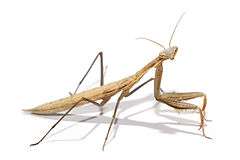Hierodulinae
The Hierodulinae are a subfamily of praying mantids, originally used by Brunner von Wattenwyl.[1] It was restored as part of a major revision of mantid taxonomy,[2] and now contains genera previously placed elsewhere in the family Mantidae.
| Hierodulinae | |
|---|---|
.jpg) | |
| Hierodula sp. | |
| Scientific classification | |
| Kingdom: | Animalia |
| Phylum: | Arthropoda |
| Class: | Insecta |
| Order: | Mantodea |
| Family: | Mantidae |
| Subfamily: | Hierodulinae Brunner von Wattenwyl, 1893 |
The new placement means that this taxon is part of the superfamily Mantoidea (of group Cernomantodea) and infraorder Schizomantodea. Species have been recorded from: Africa, Asia and Australia.[3]
Tribes and Genera
This subfamily now contains many genera that were previously placed elsewhere including the Mantinae. The Mantodea Species File lists two tribes here:[3]
Archimantini

- subtribe Archimantina
- Archimantis Saussure, 1869
- Austromantis Sjostedt, 1918
- Austrovates Sjostedt, 1918
- Coenomantis Giglio-Tos, 1917
- Corthylomantis Milledge, 1997
- Nullabora Tindale, 1923
- subtribe Pseudomantina
- Pseudomantis Saussure, 1869
- subtribe Trachymantina
- Sphodropoda Stal, 1871
- Trachymantis Giglio-Tos, 1917
- Zopheromantis Tindale, 1924
Hierodulini
- Camelomantis Giglio-Tos, 1917
- Chlorocalis Stiewe, Shcherbakov & Vermeersch, 2019
- Dracomantis – monotypic D. mirofraternus Shcherbakov & Vermeersch, 2020
- Ephierodula Giglio-Tos, 1912
- Gretella – monotypic G. gracilis Werner, 1923
- Hierodula Burmeister, 1838
- Hierodulella Giglio-Tos, 1912
- Mekongomantis – monotypic M. quinquespinosa Schwarz, Ehrmann & Shcherbakov, 2018
- Pnigomantis Giglio-Tos, 1917 – monotypic P. medioconstricta Westwood, 1889
- Rhombodera Burmeister, 1838
- Rhombomantis Ehrmann & Borer, 2015
- Stictomantis Beier, 1942 – monotypic S. cinctipes Werner, 1916
- Tamolanica Werner, 1923
- Tismomorpha Roy, 1973
gollark: ... that's the opposite of how it works?
gollark: I mean, it did... mildly reduce carbon dioxide output temporarily, is all.
gollark: How are those things related?
gollark: ... what?
gollark: Apparently, global cooling.
References
- Brunner von Wattenwyl C (1893) Revis. Syst. Orth.
- Schwarz CJ, Roy R (2019) The systematics of Mantodea revisited: an updated classification incorporating multiple data sources (Insecta: Dictyoptera) Annales de la Société entomologique de France (N.S.) International Journal of Entomology 55 (2): 101-196.
- Mantodea Species File (Version 5.0/5.0, retrieved 11 July 2020)
External Links


This article is issued from Wikipedia. The text is licensed under Creative Commons - Attribution - Sharealike. Additional terms may apply for the media files.